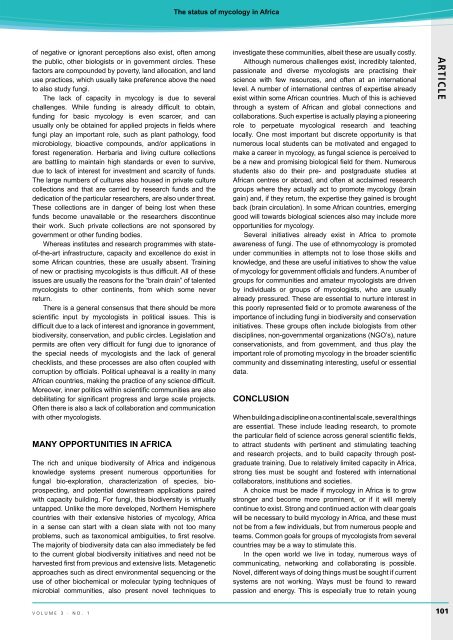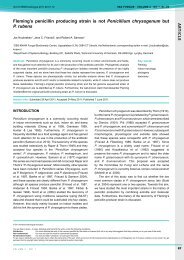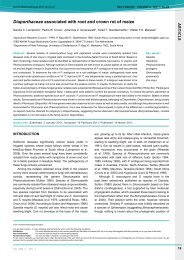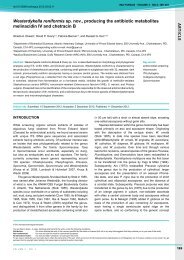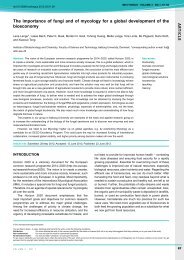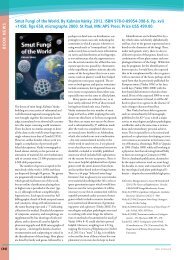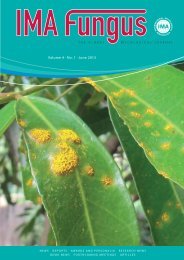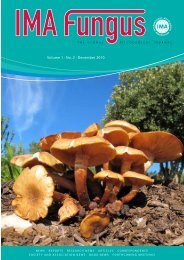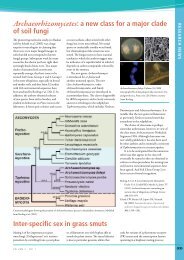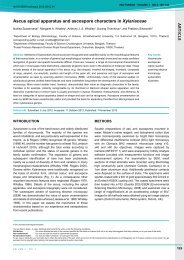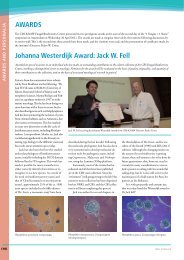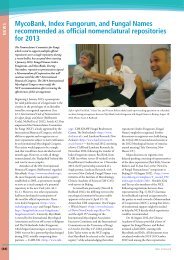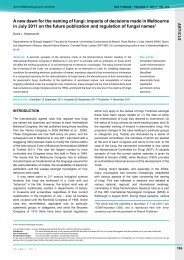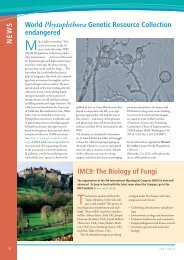complete issue - IMA Fungus
complete issue - IMA Fungus
complete issue - IMA Fungus
Create successful ePaper yourself
Turn your PDF publications into a flip-book with our unique Google optimized e-Paper software.
of negative or ignorant perceptions also exist, often among<br />
the public, other biologists or in government circles. These<br />
factors are compounded by poverty, land allocation, and land<br />
use practices, which usually take preference above the need<br />
to also study fungi.<br />
The lack of capacity in mycology is due to several<br />
challenges. While funding is already difficult to obtain,<br />
funding for basic mycology is even scarcer, and can<br />
usually only be obtained for applied projects in fields where<br />
fungi play an important role, such as plant pathology, food<br />
microbiology, bioactive compounds, and/or applications in<br />
forest regeneration. Herbaria and living culture collections<br />
are battling to maintain high standards or even to survive,<br />
due to lack of interest for investment and scarcity of funds.<br />
The large numbers of cultures also housed in private culture<br />
collections and that are carried by research funds and the<br />
dedication of the particular researchers, are also under threat.<br />
These collections are in danger of being lost when these<br />
funds become unavailable or the researchers discontinue<br />
their work. Such private collections are not sponsored by<br />
government or other funding bodies.<br />
Whereas institutes and research programmes with stateof-the-art<br />
infrastructure, capacity and excellence do exist in<br />
some African countries, these are usually absent. Training<br />
of new or practising mycologists is thus difficult. All of these<br />
<strong>issue</strong>s are usually the reasons for the “brain drain” of talented<br />
mycologists to other continents, from which some never<br />
return.<br />
There is a general consensus that there should be more<br />
scientific input by mycologists in political <strong>issue</strong>s. This is<br />
difficult due to a lack of interest and ignorance in government,<br />
biodiversity, conservation, and public circles. Legislation and<br />
permits are often very difficult for fungi due to ignorance of<br />
the special needs of mycologists and the lack of general<br />
checklists, and these processes are also often coupled with<br />
corruption by officials. Political upheaval is a reality in many<br />
African countries, making the practice of any science difficult.<br />
Moreover, inner politics within scientific communities are also<br />
debilitating for significant progress and large scale projects.<br />
Often there is also a lack of collaboration and communication<br />
with other mycologists.<br />
MANy oPPortuNItIes IN AFrIcA<br />
The rich and unique biodiversity of Africa and indigenous<br />
knowledge systems present numerous opportunities for<br />
fungal bio-exploration, characterization of species, bioprospecting,<br />
and potential downstream applications paired<br />
with capacity building. For fungi, this biodiversity is virtually<br />
untapped. Unlike the more developed, Northern Hemisphere<br />
countries with their extensive histories of mycology, Africa<br />
in a sense can start with a clean slate with not too many<br />
problems, such as taxonomical ambiguities, to first resolve.<br />
The majority of biodiversity data can also immediately be fed<br />
to the current global biodiversity initiatives and need not be<br />
harvested first from previous and extensive lists. Metagenetic<br />
approaches such as direct environmental sequencing or the<br />
use of other biochemical or molecular typing techniques of<br />
microbial communities, also present novel techniques to<br />
volume 3 · no. 1<br />
The status of mycology in Africa<br />
investigate these communities, albeit these are usually costly.<br />
Although numerous challenges exist, incredibly talented,<br />
passionate and diverse mycologists are practising their<br />
science with few resources, and often at an international<br />
level. A number of international centres of expertise already<br />
exist within some African countries. Much of this is achieved<br />
through a system of African and global connections and<br />
collaborations. Such expertise is actually playing a pioneering<br />
role to perpetuate mycological research and teaching<br />
locally. One most important but discrete opportunity is that<br />
numerous local students can be motivated and engaged to<br />
make a career in mycology, as fungal science is perceived to<br />
be a new and promising biological field for them. Numerous<br />
students also do their pre- and postgraduate studies at<br />
African centres or abroad, and often at acclaimed research<br />
groups where they actually act to promote mycology (brain<br />
gain) and, if they return, the expertise they gained is brought<br />
back (brain circulation). In some African countries, emerging<br />
good will towards biological sciences also may include more<br />
opportunities for mycology.<br />
Several initiatives already exist in Africa to promote<br />
awareness of fungi. The use of ethnomycology is promoted<br />
under communities in attempts not to lose those skills and<br />
knowledge, and these are useful initiatives to show the value<br />
of mycology for government officials and funders. A number of<br />
groups for communities and amateur mycologists are driven<br />
by individuals or groups of mycologists, who are usually<br />
already pressured. These are essential to nurture interest in<br />
this poorly represented field or to promote awareness of the<br />
importance of including fungi in biodiversity and conservation<br />
initiatives. These groups often include biologists from other<br />
disciplines, non-governmental organizations (NGO’s), nature<br />
conservationists, and from government, and thus play the<br />
important role of promoting mycology in the broader scientific<br />
community and disseminating interesting, useful or essential<br />
data.<br />
coNclusIoN<br />
When building a discipline on a continental scale, several things<br />
are essential. These include leading research, to promote<br />
the particular field of science across general scientific fields,<br />
to attract students with pertinent and stimulating teaching<br />
and research projects, and to build capacity through postgraduate<br />
training. Due to relatively limited capacity in Africa,<br />
strong ties must be sought and fostered with international<br />
collaborators, institutions and societies.<br />
A choice must be made if mycology in Africa is to grow<br />
stronger and become more prominent, or if it will merely<br />
continue to exist. Strong and continued action with clear goals<br />
will be necessary to build mycology in Africa, and these must<br />
not be from a few individuals, but from numerous people and<br />
teams. Common goals for groups of mycologists from several<br />
countries may be a way to stimulate this.<br />
In the open world we live in today, numerous ways of<br />
communicating, networking and collaborating is possible.<br />
Novel, different ways of doing things must be sought if current<br />
systems are not working. Ways must be found to reward<br />
passion and energy. This is especially true to retain young<br />
ARTIcLE 101


